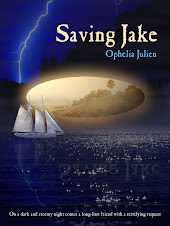Robert Frost once wrote, "No tears in the writer, no tears in the reader."
Today I'm going to talk about that, with only a glancing nod at ghosts because without emotions, no ghost story would survive.
I write about people who have lost someone. I write about dead people who have lost their way. I couch all of this in terms of frightening apparitions and uneasy situations, but the bottom line is that I write about loss. And for me, the underlying current in all of my stories has been the profound sadness and confusion that comes with losing a loved one. I sometimes can't help thinking that such sadness is at the heart of every true ghost story, even if the spirit comes back vengeful and wicked and seeking to do harm.
Due to my chosen topic, I confront the idea of losing a loved one on a regular basis. And to tell you the truth, that does impinge on my everyday life. I probably think about dying and death a lot more than I should, even given my job. It's necessary but really uncomfortable. Who wants to think about losing a best friend, or a child, or a spouse? Just the idea can sometimes be a spear to my heart, and the tears that come with that thought are very real.
But Frost is right.
Saving Jake, which is a Bridgeton Park Cemetery Book even though it doesn't feature the same characters as those in the official series, is a book that took me fourteen years to write. That's because the pain I was dealing with when putting that down on paper was sometimes so severe that I needed to stop writing. Like frequently. I got to the point where I wrote a completely separate book during those fourteen years, but that's a different story, pun intended. What you need to know is that although Saving Jake exorcised some of my demons for me, it also put me through the wringer.
Enter Cassie Valentine and Michael Penfield. In Haunted, both of them are dealing with very heavy-duty losses. And the cowardly author who was trying to tell their story was hiding from it. When I finished my first attempt at the book, I handed it over to my editor at the time (the one who published Saving Jake) and she returned it with the comment, "This book is missing something. You."
Point taken. She was calling me out for trying to dodge the pain and she was right. When I had the courage to try again, I wrote the draft that eventually became Haunted. The tears Cassie cries for Daniel tore through me as well. I felt the dreadful howling absence in her life that resulted from Daniel's death. And I felt every tentative step she took in learning to trust love again in the form of Michael Penfield.
I realize now that writing means routinely hurting myself. I know how absurd that sounds, but it's true. And I think it's true for all the authors I consider my instructors. In fact, when one of them (New York Times bestsellers, all) puts out a book that doesn't include anything of the author, much like the original first draft my editor rejected, I believe it shows. Stephen King lost himself in substance abuse for a few years and at least as many bestsellers. That fact did not come out until years later, but it explained why I found some of his middle-of-career books unreadable. They were missing something. Him.
Sometimes the writer who directs my fingers, who whispers the stories in my ear as I sit at the keyboard, is in a lighter mood and those stories will be a bit less somber in tone, sunnier, probably funnier (at least, I hope my readers find the humorous bits I write to be funny). But alas, such stories will also include at least a thread of that sadness due to loss. They must. I write ghost stories.
And what does that say about those of us who read these kinds of work? Maybe that we grope for ways to cope with the stunning losses we must all experience in this life? Maybe that we hope there is more than just this life, as short and brutal as it can be at times? Maybe that ongoing search for some kind of assurance that death is not so final, so very cruel, is the basis for the entire industry of ghost and even horror stories. An industry that is basically one giant coping mechanism.
I have no answers. I just know that as I write my little books, even as I'm trying to herd in the story line for Cassie's and Michael's next adventure, that I need to let myself feel that familiar pain and loss. Without it, my books will have no soul. Hemingway said it best: "There is nothing to writing. All you do is sit down at a typewriter and bleed.”





I'm sorry writing is painful sometimes. George RR Martin had to write everything that happened before and after the Red Wedding before he could bring himself to write the Red Wedding and finish A Storm of Swords. It was too painful for him to write it chronologically. But for what it's worth, as much as I love the plots of your books, and the creepy energy - it's the soul in them that makes them great.
ReplyDeleteThank you.
ReplyDelete